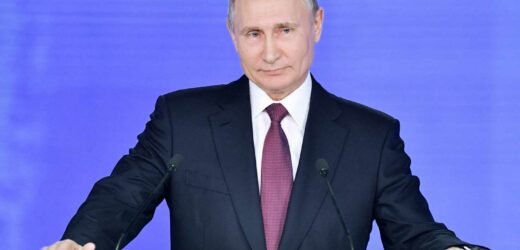POISON is becoming Vladimir Putin's weapon of choice because it is virtually undetectable, an MP declared last night.
An ex-Russian spy is believed to have been poisoned in a UK shopping centre last weekend – and is now fighting for his life.
Colonel Sergei Skripal, 66, and a woman – believed to be his daughter – are both critically ill in a Wiltshire hospital.
But an MP who lived in the Soviet Union for four years, and has done research on Russian warfare, says that poisons are much easier for the Kremlin to use to carry out attacks.
The 51-year-old told The Times: "Poisons can be untraceable, so that they are useful for covert forms of warfare. But they can also be used very obviously, as a signal and to make a point.
"If the Russians tried to shoot someone in cold blood here in the UK it would be difficult and cause problems. Using poisons would be easier."
Investigators are scrambling to identify the chemical used in the attack which has echoes of the 2006 killing of former KGB officer Alexander Litvinenko who was poisoned with radioactive polonium in London.
The pair were found slumped in the Maltings shopping centre in Salisbury, Wilts, where police said they were exposed to an unidentified substance.
But Russian state TV said today that the British press were "hyping up the story" and that they had no idea what had happened to Skripal.
What we know so far:
- Ex-Russian spy Sergei Skripal, 66, and woman, 33, – believed to be his daughter – are in a critical condition in Salisbury after being exposed to an 'unknown substance'
- An eyewitness said Skripal 'was also doing some strange hand movements looking up to the sky'
- A Zizzi restaurant in Salisbury has been closed 'as a precaution'
- Skripal was jailed for 13 years in 2006 after being found guilty of sharing Russian state secrets to MI6
- In 2010 he was swapped for glamour spy Anna Chapman as part of a deal between Russia and the US
- His wife died after joining him in the UK and his son was recently killed in a car crash in Russia
- Reports last night said Skripal had recently told police he feared for his life
- The incident echoes of the killing of former Russian spy Alexander Litvinenko
Mr Seely urged ministers to step up and take firmer action against the Russians.
He said: "We don’t see Russia as a threat to us, we see Russia as an irritant. We need to wise up.
"Russia is a country that’s trying to push the boundaries in a number of different ways, whether that is potentially attacking people in the UK or testing international alliances.”
Shadow Home Secretary Diane Abbott urged a full investigation this morning, hinting that prior police probes weren't good enough.
She told the BBC that the case bore "a striking similarity to the death of Alexander Litvinenko".
"The Russian state is very clever in making what is hit jobs look like suicide…
"This is very disturbing, and we need to know more.
"We can't allow London and home counties to become a killing field for Russia’s enemies."
And today a friend of Litvinenko's, Alexander Goldfarb, predicted that the incident could have been a bid to boost turnout in upcoming Russian elections as it could lift his image of a "tough, nationalistic leader".
He said: "Putin is worried few people will come, they are apathetic. This will be used, regardless of whether Putin did it or not, as a way to show his anti-west rhetoric."
And he also accused Britain of "appeasing" Russia.
UK-Russian relations are as ‘bad as they can get’, former ambassador declares
BRITAIN’S relationship with Russia is as bad as it could be, and we’re running out of ways to punish them, a former ambassador to the country has warned.
Tony Brenton, who was the ambassador to Russia when former KGB agent Alexander Litvinenko died from being poisoned, said today that the "locker is bare" with future punishments for the Kremlin's regieme.
"We should look for ways to show the Russians that there is a price attached to these actions," he stressted.
"We are at a state with Russia where things are as bad as they can get… and they think they can do more or less what they like."
Admitting that there were parallels with other suspicious deaths, he said that we should be "careful" not to jump to conclusions about whether Russia was indeed behind the attack.
And he defended sanctions put on the country at the time of the killing as "enough at the time" and they hoped it would never happen again.
Mr Brenton also said Russia's leader Vladimir Putin must be stopped from talking about developing dangerous nuclear weapons.
Poisons linked to Russia in the past
THERE are three known types of substance that have been linked to use to by Moscow, Bob Seely said.
- Powerful opiods such as fentanyl – thought to have been used to overcome terrorists holding 900 people hostage in Moscow in 2002. Around 130 died.
- Radioactive toxins such as polonium-210 – like which killed Russian spy Alexander Litvinenko in 2006. It's lethal to humans if it is ingested. It causes acute liver and kidney damage and other symptoms similar to the final stages of cancer. It is hugely expensive to manufacture and is so toxic that its use is restricted
- Dioxins – used in the attempted assasination of former Ukrainian President Viktor Yushchenko in 2004
MOST READ IN POLITICS
'WE'RE ALLOWED TO PARTY' 'Tipsy' No10 aide 'taunted cops after lockdown-busting booze-up'
Liz Truss to risk trade war with EU by letting Belfast blow up border deal
Heavily censored Sue Gray report on No10 parties 'to be released next week'
Boris Johnson to hold showdown talks with Vladimir Putin over Ukraine
Moment Russian double agent Sergei Skripal is arrested in 2004
Emergency crews in protective suits last night decontaminated the scene where Skripal, who came to Britain in a spy swap involving flame-haired double agent Anna Chapman, was found.
The use of CBRN (chemical, biological, radiological and nuclear) suits fuelled speculation the substance could have been radioactive or an airborne poison such as anthrax.
Officials are urging anyone in the area who feels ill to contact 111.
Last night Litvinenko's widow Marina told the Telegraph: "It looks similar to what happened to my husband but we need more information. We need to know the substance. Was it radioactive?"
Skripal, 66, and his daughter, thought to be in her 30s, were found on Sunday afternoon slumped on a bench in the shopping centre while one of them had been sick nearby.
Skripal was taken to the city’s hospital by ambulance.
Who is Sergei Skripal?
- Sergei Skripal was born on June 23 1951.
- He was arrested in December 2004 after Russia accused him of passing on identifties of its spies onto the UK's Secret Intelligence Service MI6.
- It claimed Skripal had been paid the $100,000 (£72,270) for the information which he had been supplying since in 1990s.
- At the time he was serving in the Russian Ground Forces.
- Skripal was said to have passed secrets to MI6 through a James Bond-style fake rock hidden in Moscow park.
- Russian secret services exposed the rock in 2006, revealing how agents transmitted data to it via a hidden handheld device.
- He was found guilty of 'high treason in the form of espinoage' and sentenced to 13 years in prison.
- However he was released by Moscow in 2010 following a 'spy swap' deal made between the US and Russia.
- Among the trade-off was glamour spy Anna Chapman.
- He was nicknamed 'the spy with the Louis Vuitton bag' after pictures showed him carrying a bag at an airport en route to meeting his handlers.
- Skripal was then flown to the UK and granted refuge. After settling in Salisbury in a £350,000 semi-detatched house his wife Liudmila who died in 2012.
Source: Read Full Article











